Appreciation Letter To Employee
[Your Name]
[Your Title]
[Company Name]
[Company Address]
[City, State, ZIP Code]
[Email Address]
[Phone Number]
[Date]
[Employee's Name]
[Employee's Title]
[Department]
[Company Name]
[Company Address]
[City, State, ZIP Code]
Dear [Employee's Name],
I am writing this letter to express my heartfelt appreciation for your outstanding contributions and dedication to our team and company. Your hard work, enthusiasm, and commitment have not gone unnoticed, and I want to take this opportunity to acknowledge and commend your exceptional efforts.
Your consistent dedication to your tasks and responsibilities has made a significant impact on the success of our projects and the overall performance of our department. Your ability to [mention specific skills or qualities, e.g., problem-solving, teamwork, leadership] has greatly benefited our team, and your positive attitude has contributed to a motivating and productive work environment.
In particular, I would like to highlight the following achievements and qualities that have stood out:
1. [Specific Achievement 1]: Describe a notable achievement, project completion, or milestone that the employee has accomplished.
2. [Specific Achievement 2]: Highlight another accomplishment or instance where the employee's contributions made a positive difference.
3. [Personal Quality or Strength]: Emphasize a personal quality or strength that the employee brings to the team, such as leadership, creativity, or a strong work ethic.
Your dedication and willingness to go above and beyond expectations have truly set a high standard for excellence within our organization. Your efforts reflect not only your personal commitment but also your alignment with our company values and goals.
It is employees like you who make our workplace an exceptional and rewarding environment. Your contributions inspire your colleagues and positively impact our overall performance. Please accept my sincere gratitude for your hard work and dedication.
As a token of our appreciation, we would like to present you with [mention any rewards or tokens, such as a gift card, additional paid time off, or a certificate of recognition].
Once again, thank you for your outstanding contributions, and we look forward to your continued success and growth within our organization. Your dedication truly makes a difference, and we are fortunate to have you as part of our team.
Sincerely,
[Your Name]
[Your Title]
[Company Name]
Formal Appreciation Letter for Outstanding Project Completion
Subject: Recognition of Exceptional Performance on [Project Name]
Dear [Employee Name],
I am writing to formally express my sincere appreciation for your outstanding contributions to the successful completion of the [Project Name] project. Your dedication, expertise, and unwavering commitment have been instrumental in achieving results that exceeded our initial expectations.
Throughout the project timeline, you demonstrated exceptional leadership in [specific area], particularly when [specific challenge or situation]. Your ability to [specific skill or action] not only resolved critical issues but also inspired the entire team to elevate their performance.
The impact of your work is significant. [Specific measurable result or outcome], which directly contributed to [business benefit]. Your innovative approach to [specific aspect] has set a new standard for excellence within our organization.
Your professionalism, collaborative spirit, and technical expertise exemplify the values we hold dear at [Company Name]. Employees like you are the foundation of our continued success, and I want you to know that your efforts do not go unnoticed.
Please accept my heartfelt thanks for your exceptional work. I look forward to your continued contributions to our team's success.
With sincere appreciation,
[Your Name]
[Your Title]
[Company Name]
Heartfelt Appreciation Email for Going Above and Beyond
Subject: Thank You for Going the Extra Mile
Dear [Employee Name],
I wanted to take a moment to personally thank you for your incredible dedication this past [week/month]. What you did went far beyond your job responsibilities, and it made all the difference.
When [specific situation occurred], you didn't hesitate to step up. You stayed late, came in early, and put in the extra effort to ensure that [specific outcome]. That kind of commitment doesn't just help the company—it shows the kind of person you are.
I know it wasn't easy, and I know it required sacrifice. Whether it was time away from your family, postponed plans, or just sheer exhaustion, please know that your efforts were seen, valued, and deeply appreciated.
You make our team better, and I'm grateful to work alongside someone who cares as much as you do. Thank you for being extraordinary.
Warmest regards,
[Your Name]
[Your Title]
Professional Appreciation Letter for Years of Service
Subject: Celebrating [X] Years of Dedicated Service
Dear [Employee Name],
On behalf of [Company Name], I am delighted to congratulate you on reaching [X] years of service with our organization. This significant milestone is a testament to your loyalty, dedication, and the invaluable contributions you have made throughout your tenure.
Since joining us in [year], you have been an integral part of our success. Your work in [department/role] has consistently demonstrated excellence, and your growth from [initial position] to [current position] reflects your commitment to professional development and organizational goals.
Over the years, you have [list 2-3 specific achievements or contributions]. Your expertise in [specific area] has not only benefited your immediate team but has also positively influenced our entire organization.
Beyond your professional accomplishments, you have fostered a culture of [specific cultural contribution—collaboration, mentorship, innovation, etc.]. Your positive attitude and willingness to support colleagues have made you a valued member of our workplace community.
As a token of our appreciation, please find enclosed [gift card/bonus/certificate/recognition award]. We look forward to many more years of working together and witnessing your continued success.
Thank you for your years of dedicated service and for being such an important part of our team.
With deepest appreciation,
[Your Name]
[Your Title]
[Company Name]
Casual Appreciation Email for Team Player Attitude
Subject: You're Awesome—Thank You!
Hey [Employee Name],
I just wanted to send you a quick note to say thank you for being such an amazing team player. Seriously, you make my job easier and the whole team better.
The way you jumped in to help [colleague name] with [task] last week was incredible. You didn't have to do that, but you did it anyway because that's who you are. And when [situation happened], you handled it with such grace and positivity that it completely changed the energy in the room.
People like you are rare. You bring good vibes, solid work, and genuine kindness to everything you do. The team notices it, I notice it, and I wanted to make sure you know how much it matters.
Keep being awesome. We're lucky to have you.
Thanks again,
[Your Name]
Formal Appreciation Letter for Crisis Management
Subject: Commendation for Exceptional Crisis Management
Dear [Employee Name],
I am writing to express my profound appreciation for your exceptional handling of the recent crisis involving [specific situation]. Your quick thinking, decisive action, and calm demeanor during this challenging situation were nothing short of exemplary.
When [describe the crisis], you immediately took control of the situation by [specific actions taken]. Your ability to [specific skill—assess, communicate, coordinate, etc.] under pressure prevented [potential negative outcome] and ensured [positive result achieved].
Your actions demonstrated several critical qualities: sound judgment, technical expertise, leadership under pressure, and genuine concern for [people/company/clients]. The way you [specific detail] showed remarkable professionalism and competence.
The positive outcome of this situation—[specific result]—is a direct result of your intervention. Your performance has been noted by senior management, and this letter will be placed in your personnel file as formal recognition of your outstanding service.
Thank you for your dedication to excellence and for representing the highest standards of our organization. You have our deepest gratitude and respect.
Sincerely,
[Your Name]
[Your Title]
[Company Name]
Appreciation Email for Mentorship and Leadership
Subject: Recognition of Your Outstanding Mentorship
Dear [Employee Name],
I wanted to take this opportunity to thank you for the incredible mentorship and guidance you have provided to our team members, particularly [mentee names or "new employees" or "junior staff"].
Your willingness to share your knowledge, experience, and insights has had a transformative impact on our team's development. [Specific mentee] recently shared with me how your guidance on [specific topic] helped them [specific achievement or growth]. This is just one example of the many ways you invest in others' success.
What sets you apart as a mentor is not just your technical expertise, but your patience, approachability, and genuine interest in helping others grow. You create a safe environment for questions, you celebrate others' successes, and you provide constructive feedback that builds confidence rather than diminishing it.
The culture of learning and collaboration that you foster extends far beyond your immediate responsibilities. You are developing the next generation of leaders in our organization, and that contribution is invaluable.
Thank you for being a role model, a teacher, and a leader. Your impact will be felt for years to come through the professionals you have helped develop.
With gratitude,
[Your Name]
[Your Title]
Appreciation Letter for Innovation and Creative Problem-Solving
Subject: Appreciation for Your Innovative Solution
Dear [Employee Name],
I am writing to commend you for your innovative approach to [specific challenge or problem]. Your creative solution has not only resolved an ongoing issue but has also opened new possibilities for our team and organization.
Your idea to [describe the innovation] was both original and practical. What impressed me most was your initiative in [specific action—researching, proposing, prototyping, implementing]. You didn't just identify the problem; you took ownership of finding and executing the solution.
The results speak for themselves: [specific quantifiable results—cost savings, time efficiency, improved quality, customer satisfaction, etc.]. Beyond these immediate benefits, your approach has changed the way we think about [specific process or area].
Your willingness to challenge the status quo and think outside conventional boundaries is exactly the kind of mindset that drives organizational progress. Innovation requires courage, and you demonstrated both vision and the determination to see it through.
Thank you for your creativity, initiative, and commitment to continuous improvement. I encourage you to continue bringing your innovative ideas forward—they make a real difference.
Best regards,
[Your Name]
[Your Title]
Quick Appreciation Email for Daily Excellence
Subject: Thank You for Your Excellent Work
Hi [Employee Name],
I wanted to send a quick note to let you know that your consistent excellent work doesn't go unnoticed. Day in and day out, you show up, do great work, and maintain a positive attitude. That consistency is valuable and appreciated.
Thank you for being reliable, professional, and excellent at what you do.
Best,
[Your Name]
Appreciation Letter for Customer Service Excellence
Subject: Commendation for Exceptional Customer Service
Dear [Employee Name],
I am pleased to inform you that we recently received outstanding feedback from [customer name/multiple customers] regarding the service you provided. Your dedication to customer satisfaction exemplifies our company values and sets a high standard for excellence.
According to the feedback, you [specific actions taken or behaviors demonstrated]. The customer specifically mentioned your [qualities—patience, knowledge, responsiveness, problem-solving ability] and expressed that their experience with you exceeded their expectations.
What distinguishes your approach to customer service is your ability to [specific skill or quality]. You don't just resolve issues; you create positive experiences that build lasting relationships and loyalty.
Your performance has directly contributed to [specific business outcome—customer retention, positive reviews, referrals, etc.]. This kind of impact is invaluable to our organization's reputation and success.
Please accept my sincere thanks for your commitment to excellence in customer service. You represent the best of what our company stands for.
With appreciation,
[Your Name]
[Your Title]
What Is an Appreciation Letter to Employee and Why Send One
An appreciation letter to an employee is a formal or informal written communication that recognizes and thanks an employee for their contributions, achievements, behaviors, or dedication to the organization. The purpose extends beyond simple acknowledgment:
- Reinforces positive behaviors and performance that leadership wants to see continued and replicated
- Boosts employee morale and motivation by providing psychological rewards for good work
- Strengthens retention by making employees feel valued and seen in their workplace
- Creates documentation of excellence that can be referenced during performance reviews and promotion considerations
- Builds workplace culture by establishing norms of recognition and appreciation
- Improves engagement by connecting individual efforts to organizational success
- Demonstrates leadership values showing that management notices and cares about employee contributions
- Provides tangible recognition that employees can keep, share with family, or include in professional portfolios
When to Send Employee Appreciation Letters
- Project completion: After successful delivery of major projects or initiatives, especially those requiring extra effort
- Performance milestones: When employees achieve significant goals, exceed targets, or reach new performance levels
- Service anniversaries: At 1, 5, 10, 15, 20+ year milestones to recognize tenure and loyalty
- Going above and beyond: When employees exceed normal job expectations or work outside their role to help
- Crisis management: After employees successfully handle emergencies, difficult situations, or unexpected challenges
- Innovation and improvement: When employees suggest or implement ideas that improve processes, save costs, or increase efficiency
- Exceptional customer service: Following positive customer feedback, testimonials, or resolved difficult customer situations
- Mentorship contributions: When employees invest time developing others or positively impacting team culture
- Quality excellence: After consistently high-quality work, zero-defect performance, or significant quality improvements
- Team collaboration: When employees demonstrate outstanding teamwork, conflict resolution, or cross-functional cooperation
- End of year: Annual recognition letters summarizing contributions throughout the year
- Spontaneous recognition: Anytime you observe excellence that deserves immediate acknowledgment
Who Should Send Employee Appreciation Letters
- Direct supervisors and managers: Most common senders as they work closely with employees daily
- Department heads: For recognizing contributions that impact the entire department
- Senior executives and C-suite: For high-impact achievements or milestone recognitions that carry added weight
- HR department: For company-wide initiatives, service anniversaries, or policy-related recognitions
- Project managers: For project-specific contributions from team members
- Peer employees: Informal peer-to-peer appreciation notes fostering collaborative culture
- Cross-functional leaders: When employees contribute significantly to other departments or teams
- Company founders or owners: For exceptional situations or long-tenured employees where personal recognition is meaningful
- Board members or company leadership: For organization-level impacts or major achievements
- Client or customer representatives: Third-party validation letters that carry unique weight
To Whom Should Appreciation Letters Be Addressed
- Individual employees: Most common—single person being recognized for specific contributions
- Teams or groups: When collective effort deserves recognition and individual breakdown isn't necessary
- Department-wide: Recognizing entire department achievements or culture
- Remote employees: Ensuring virtual team members receive equal recognition as on-site staff
- Part-time or contract workers: Including all workforce types in recognition programs
- New employees: Recognizing early contributions to reinforce positive onboarding experiences
- Long-tenured employees: Veterans who may be overlooked but provide consistent excellence
- Employees at all levels: From entry-level to management—recognition should be hierarchically diverse
- Retiring employees: Special recognition for career contributions and legacy
- Employees across locations: Multi-site organizations ensuring equitable recognition
How to Write an Effective Employee Appreciation Letter
- Be specific and concrete: Mention exact actions, projects, behaviors, or outcomes rather than generic praise
- Use storytelling: Describe the situation, what the employee did, and the impact it created
- Quantify when possible: Include measurable results, metrics, or specific examples that show impact
- Make it timely: Send recognition soon after the event or achievement while it's still fresh
- Personalize the message: Reference the individual's unique contributions, style, or characteristics
- Connect to values: Link the employee's actions to company values, mission, or strategic goals
- Express genuine emotion: Let authentic appreciation show through your word choice and tone
- Consider the audience: Match formality level to the situation, relationship, and company culture
- Be forward-looking: Express confidence in continued excellence and future contributions
- Proofread carefully: Errors undermine the sincerity and professionalism of recognition
- Include proper documentation: If going in personnel file, ensure it meets company standards
- Follow company protocols: Use official letterhead for formal recognition when appropriate
Essential Elements and Structure of Appreciation Letters
- Clear subject line: For emails, immediately indicate the purpose (e.g., "Recognition for Outstanding Performance")
- Professional greeting: Use appropriate salutation based on formality level and relationship
- Opening statement: Immediately state the purpose—expressing appreciation for specific contribution
- Specific description: Detail what the employee did, when, and under what circumstances
- Impact explanation: Describe the results, benefits, or outcomes of the employee's actions
- Values connection: Link actions to company values, culture, or strategic priorities
- Personal acknowledgment: Recognize the effort, skill, sacrifice, or qualities demonstrated
- Future outlook: Express confidence in continued contributions or career growth
- Gratitude restatement: Reinforce your thanks before closing
- Professional closing: Sign with appropriate closing phrase and include title and company
- Optional additions: Mention if letter will be in personnel file, if accompanied by reward, or if copies sent to others
- Attachments: Include any certificates, awards, or relevant documentation
Formatting Guidelines for Employee Appreciation Letters
- Length: Formal letters should be 250-500 words; informal emails can be 100-200 words; quick notes 50-100 words
- Tone: Match formality to situation—formal for documentation and milestones, casual for spontaneous daily recognition
- Medium: Printed letters for significant recognitions and personnel files; emails for timely and frequent recognition
- Format: Use company letterhead for official recognition; standard email for informal appreciation
- Font and style: Professional fonts (Arial, Calibri, Times New Roman) at 11-12pt for printed letters
- Spacing: Single-spaced paragraphs with double space between paragraphs for readability
- Signature: Handwritten signature on printed letters adds personal touch; typed signature acceptable for emails
- Copies: Consider cc'ing HR, senior management, or others when appropriate for visibility
- File documentation: Formal letters should be placed in employee personnel files with proper dating
- Delivery method: Hand-deliver important letters personally, send emails during business hours, mail for remote employees
- Timing: Send appreciation during business hours; avoid late nights or weekends unless time-sensitive
Common Mistakes to Avoid in Employee Appreciation Letters
- Being too generic: Using template language that could apply to anyone diminishes authenticity
- Delayed recognition: Waiting too long after the achievement reduces impact and relevance
- Comparing employees: Saying "better than others" or "unlike some employees" creates negative dynamics
- Qualified praise: Using "but" or "however" that undermines the recognition
- Focusing on yourself: Making the letter about how their work helped you rather than recognizing them
- Being too brief: Superficial "good job" messages without substance feel insincere
- Grammatical errors: Typos and mistakes undermine professionalism and appear careless
- Exaggerating: Overstating impact or using hyperbole reduces credibility
- Forgetting team members: Recognizing one person while ignoring others who contributed creates resentment
- Backdoor requests: Using appreciation letter as setup to ask for more work or favors
- Public embarrassment: Over-praising shy employees publicly when they prefer private recognition
- Inconsistent recognition: Only recognizing certain types of employees or contributions creates perceived favoritism
- Empty promises: Suggesting rewards, promotions, or opportunities you cannot deliver
Best Practices and Tips for Employee Appreciation Letters
- Keep a recognition journal: Document notable contributions throughout the year for timely and comprehensive recognition
- Personalize every letter: Never send identical letters to multiple employees—each person deserves unique recognition
- Seek input from others: Ask colleagues or team members for details about contributions you might have missed
- Include specific quotes: Reference what the employee said or how they approached the situation
- Make it public when appropriate: Share recognition in team meetings, newsletters, or company communications with employee permission
- Follow up verbally: Deliver or discuss the letter in person when possible for added impact
- Create consistency: Establish regular recognition rhythms so all employees have opportunities to be acknowledged
- Save copies: Maintain records of all appreciation letters sent for performance review references
- Train managers: Ensure all leaders understand importance and techniques of effective written recognition
- Balance frequency: Recognize often enough to maintain motivation but not so frequently that it loses meaning
- Match reward to achievement: Pair significant achievements with tangible recognition (bonuses, time off, awards)
- Use employee preferences: Some prefer public recognition, others private—know your audience
- Leverage technology: Use digital platforms for broader visibility while maintaining personal touch
What to Do After Sending an Appreciation Letter
- File official copies: Place formal letters in employee personnel files for performance review documentation
- Follow up verbally: Reinforce written appreciation with in-person or phone conversation
- Monitor impact: Observe whether recognition positively affects the employee's engagement and performance
- Share broadly when appropriate: Post recognition in company newsletters, intranet, or team communications
- Include in performance reviews: Reference specific appreciation letters during formal evaluation discussions
- Continue observing: Look for ongoing excellent performance worthy of additional future recognition
- Request feedback: Ask employees if they appreciate the recognition and how it could be more meaningful
- No expectation of response: Appreciation letters don't require thank-you responses—they're gifts of recognition
- Track patterns: Monitor which employees receive recognition to ensure fairness and equity
- Celebrate team-wide: When appropriate, share individual recognition to inspire and set examples for others
- Link to development: Use recognized strengths as basis for growth opportunities and new responsibilities
- Update leadership: Inform senior management of notable recognitions for broader organizational awareness
Advantages and Disadvantages of Employee Appreciation Letters
Advantages:
- Cost-effective recognition method requiring only time and thoughtfulness
- Creates permanent, tangible record of achievement employees can keep
- Boosts morale, motivation, and job satisfaction significantly
- Improves retention by making employees feel valued and seen
- Strengthens employer-employee relationships and trust
- Provides documentation for performance reviews and promotion decisions
- Reinforces desired behaviors and performance standards
- Enhances company culture of recognition and appreciation
- Can be shared with family and included in professional portfolios
- Increases employee engagement and discretionary effort
Disadvantages:
- Time-intensive to personalize and write thoughtfully for each employee
- Can create jealousy or resentment among unrecognized employees
- May lose impact if overused or written without genuine specificity
- Poorly written letters can feel insincere or obligatory
- Creates expectations for consistent recognition requiring ongoing effort
- Can highlight favoritism if not distributed equitably across team
- May ring hollow without accompanying tangible rewards for major achievements
- Requires management training and skill to execute effectively
Comparing Appreciation Letters to Other Recognition Methods
Appreciation Letters vs. Verbal Praise:
- Letters provide permanent documentation; verbal praise is momentary
- Written recognition can be shared and referenced later
- Verbal praise is more spontaneous and immediate
- Letters require more effort but carry more weight
Appreciation Letters vs. Monetary Bonuses:
- Letters provide psychological rewards; bonuses provide financial rewards
- Bonuses may be expected or obligatory; letters are more personal
- Letters can accompany bonuses for maximum impact
- Letters are budget-neutral while bonuses require financial resources
Appreciation Letters vs. Public Recognition:
- Letters can be private respecting employee preferences
- Public recognition provides peer validation and broader visibility
- Letters are permanent records; public moments are temporary
- Best practice combines both approaches when appropriate
Appreciation Letters vs. Awards and Certificates:
- Letters provide detailed personalized narrative; awards are symbolic
- Certificates can accompany letters for added formality
- Letters explain "why" while awards show "what"
- Combined approach provides most meaningful recognition
Alternative Recognition Methods:
- Employee of the month/quarter programs
- Peer recognition platforms and systems
- Extra paid time off or flexible schedule rewards
- Professional development opportunities
- Promotion or increased responsibilities
- Gift cards or tangible gifts
- Team celebrations or events
Frequently Asked Questions About Employee Appreciation Letters
Should appreciation letters go in employee personnel files? Formal letters recognizing significant achievements should be filed; casual emails typically don't need filing.
How often should I send appreciation letters? No fixed frequency—send whenever recognition is genuinely deserved, balancing consistency with meaningfulness.
Can I use templates for appreciation letters? Templates can provide structure, but every letter must be substantially personalized to be authentic.
Should I send copies to others? For formal recognition, consider copying HR and senior management; for informal notes, direct delivery is sufficient.
What if I'm not good at writing? Focus on sincerity and specificity rather than eloquent prose—authentic appreciation matters more than perfect writing.
Do I need approval before sending appreciation letters? Informal recognition typically doesn't require approval; formal letters going in files may need HR coordination.
Should appreciation letters mention compensation or promotion? Only if you have authority to deliver on such statements; otherwise, avoid creating false expectations.
Can I appreciate employees who are leaving? Absolutely—exit appreciation letters acknowledge contributions and maintain positive relationships.
What if the employee doesn't respond? Appreciation letters don't require responses—they're gifts of recognition, not correspondence requiring replies.
Should I recognize the same employee multiple times? Yes, each distinct achievement deserves recognition, but ensure equity across your entire team.
Requirements and Prerequisites Before Sending Appreciation Letters
- Specific knowledge: Gather detailed information about what the employee did, when, and the impact created
- Verification: Confirm facts, results, and details are accurate before committing them to writing
- Context understanding: Know the challenges, constraints, or circumstances that made the achievement notable
- Company guidelines: Review organizational policies regarding employee recognition and documentation
- Appropriate authority: Ensure you have standing to provide official recognition to the employee
- Personnel file access: If letter will be filed officially, coordinate with HR for proper documentation
- Budget approval: If appreciation includes tangible rewards or bonuses, secure necessary approvals
- Time allocation: Set aside focused time to write thoughtfully rather than rushing the letter
- Employee preferences: Consider whether employee prefers public or private recognition
- Team dynamics: Assess whether recognition might inadvertently create negative team dynamics
- Timing considerations: Choose appropriate moment for maximum impact and relevance
- Supporting documentation: Gather any relevant data, customer feedback, or metrics to support claims

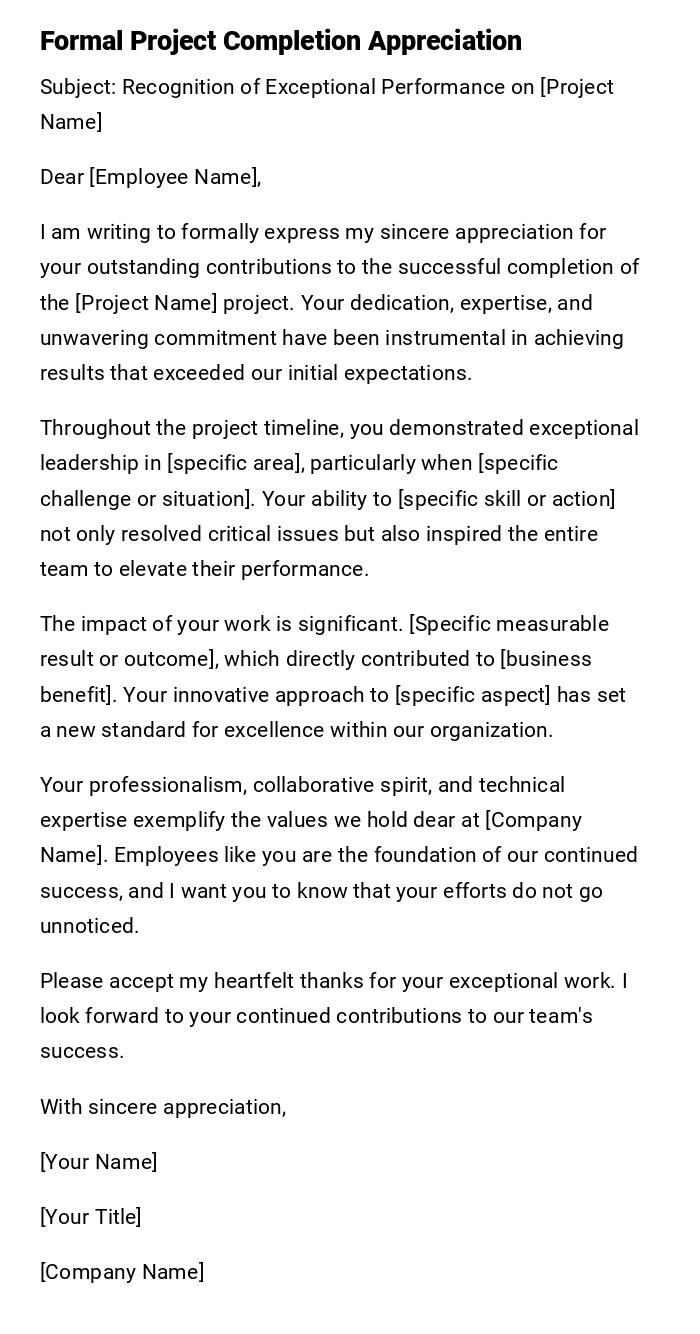
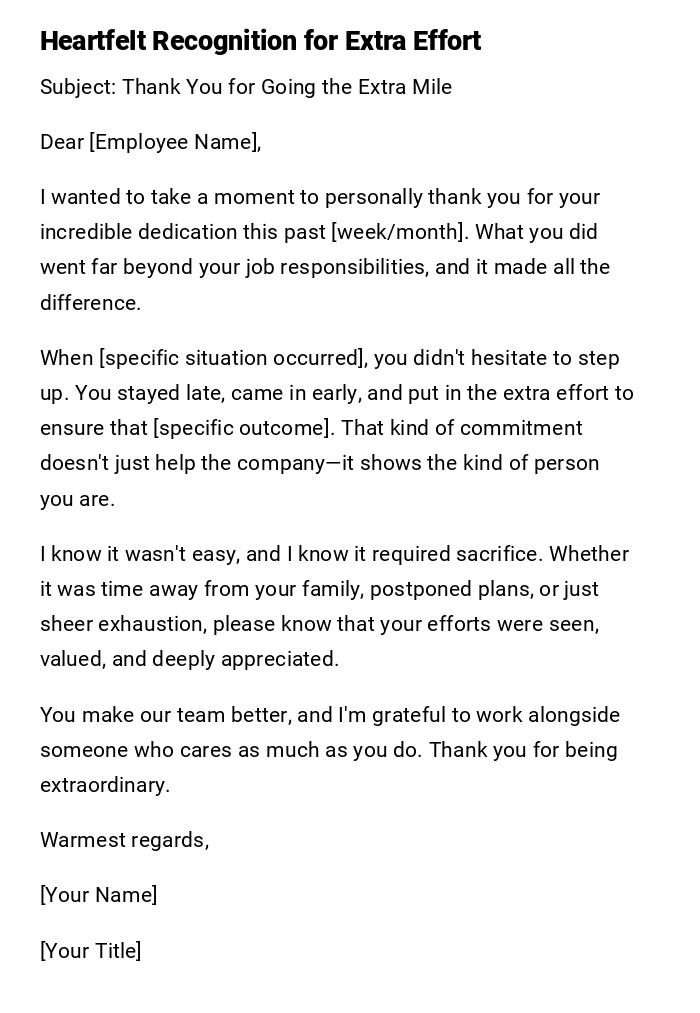
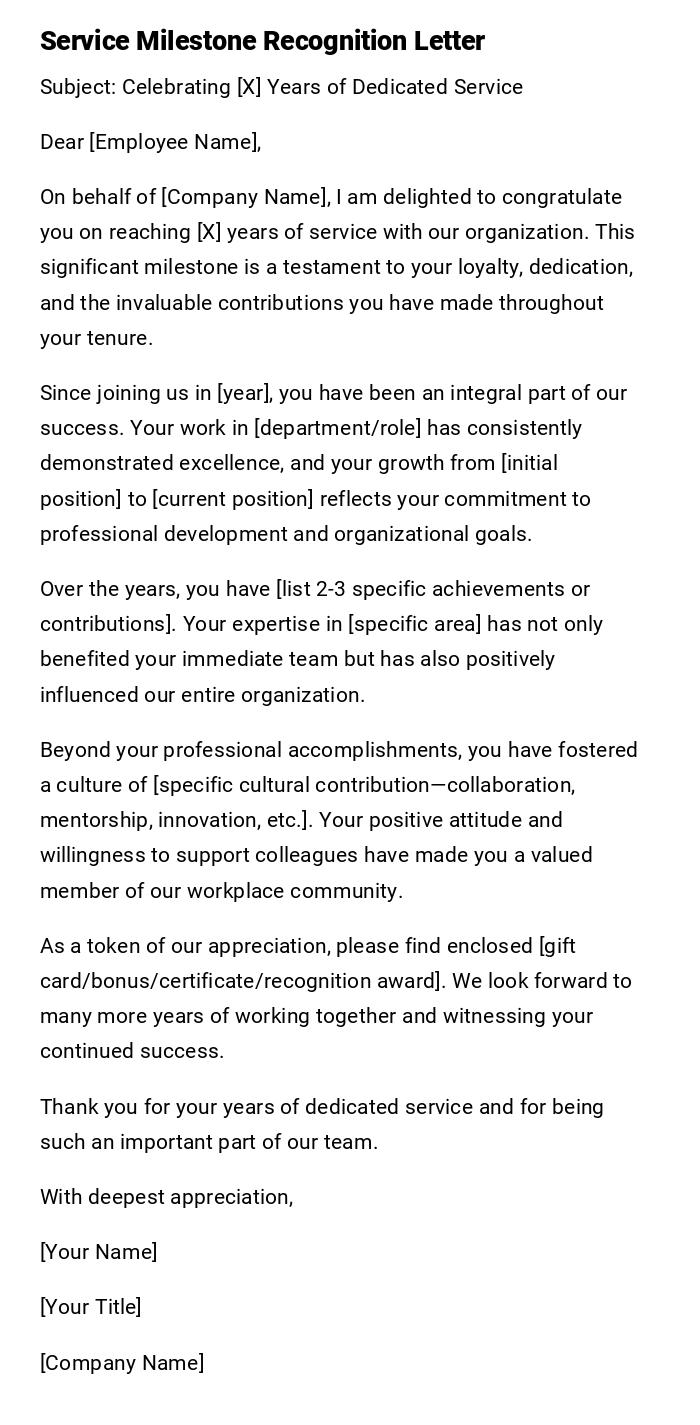
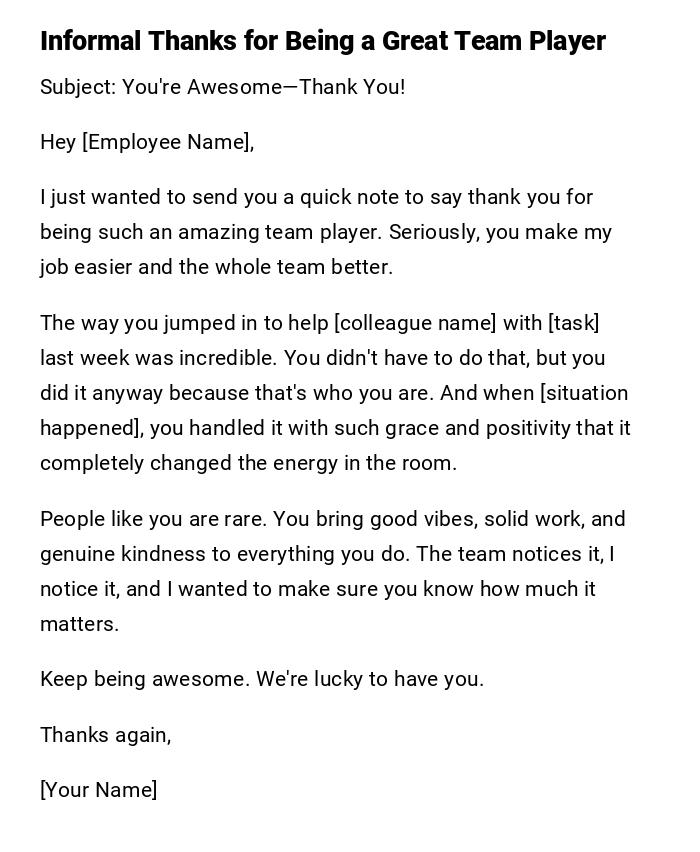
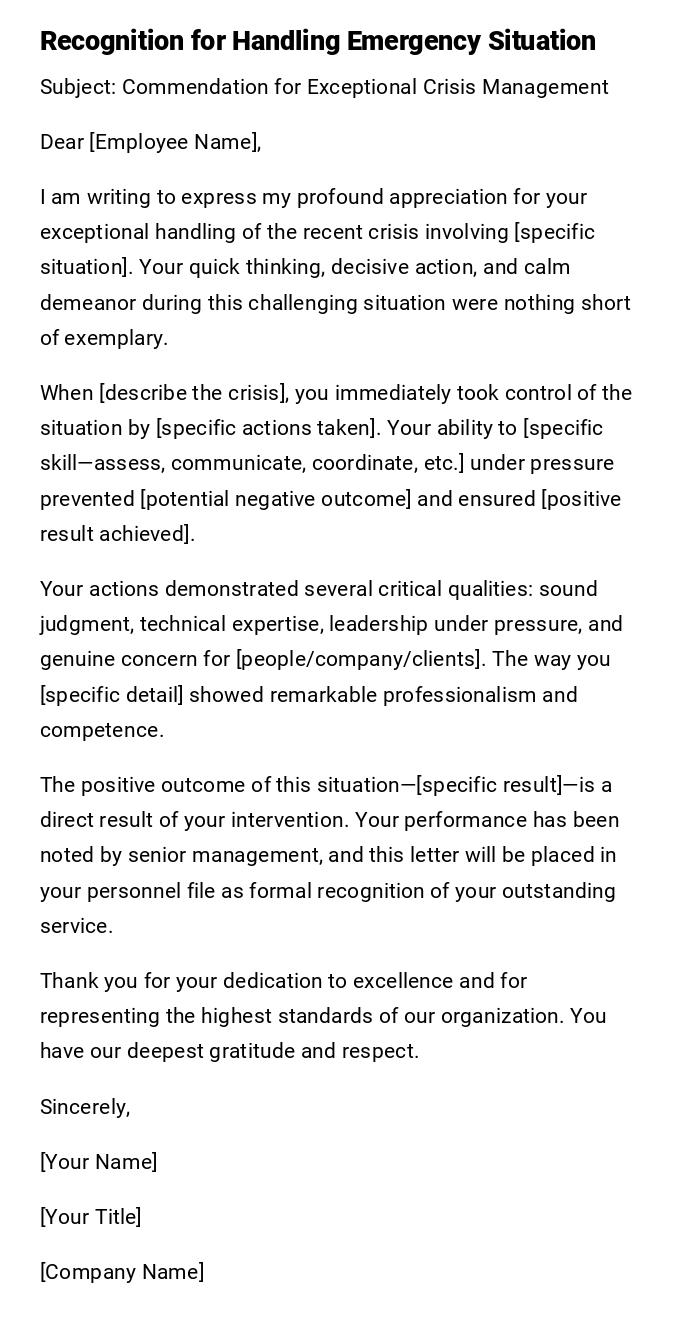
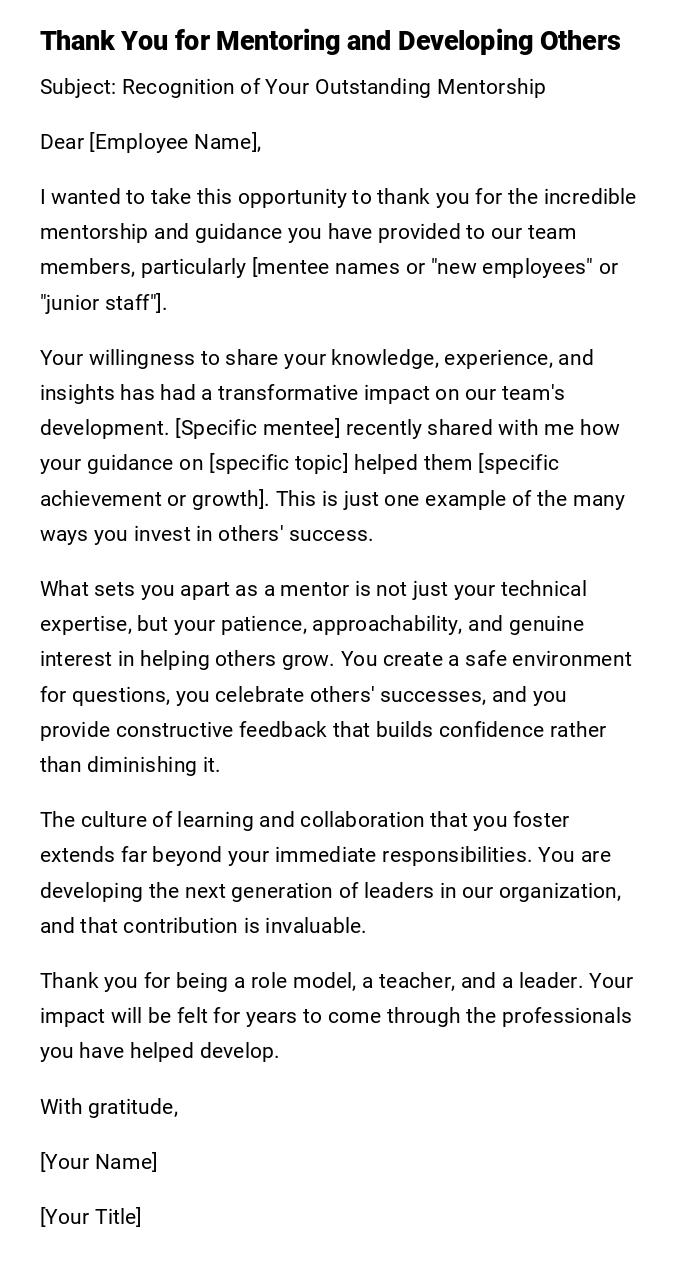
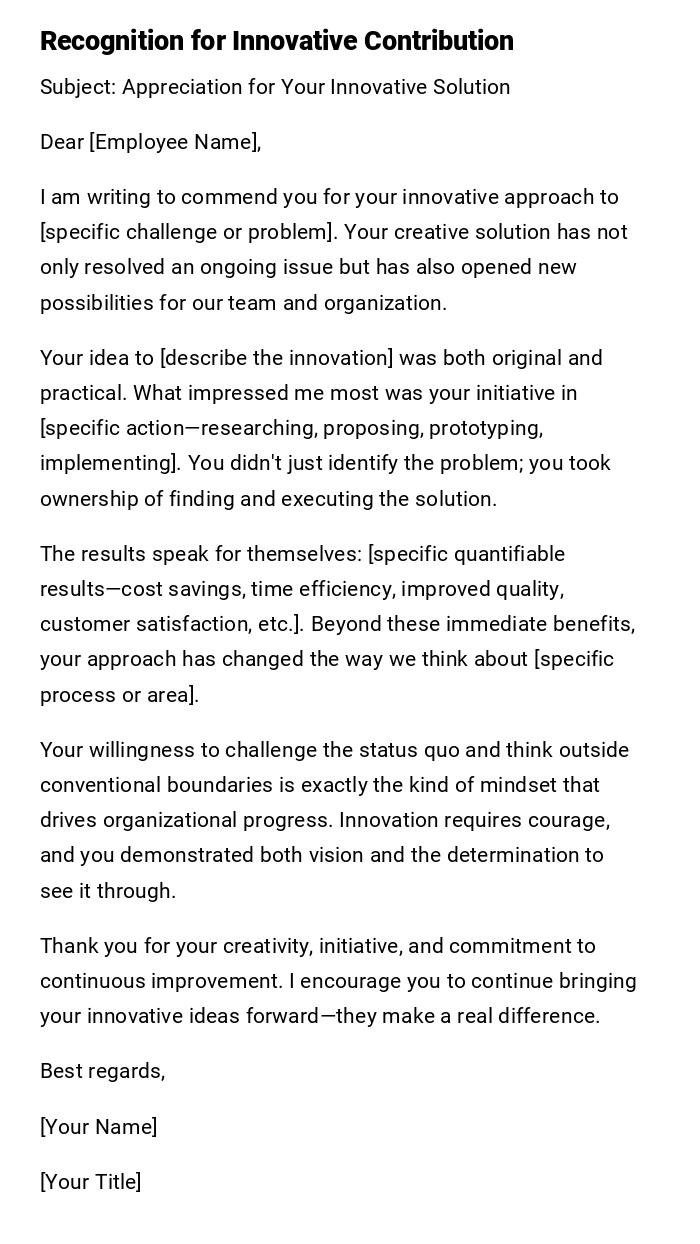
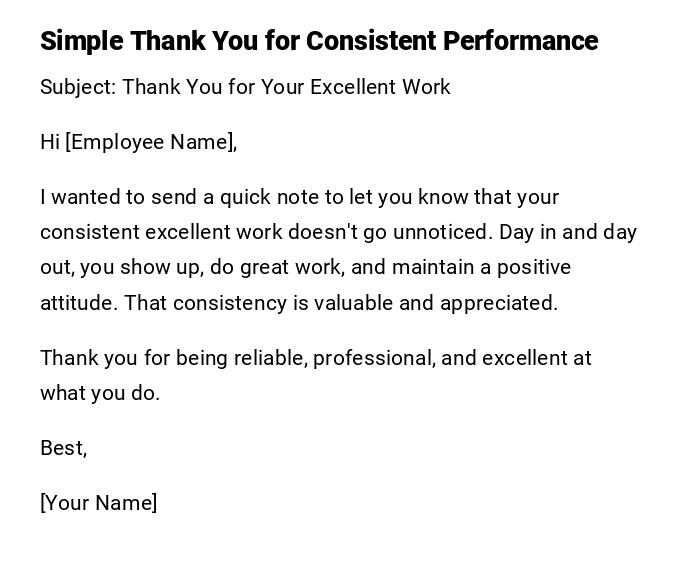
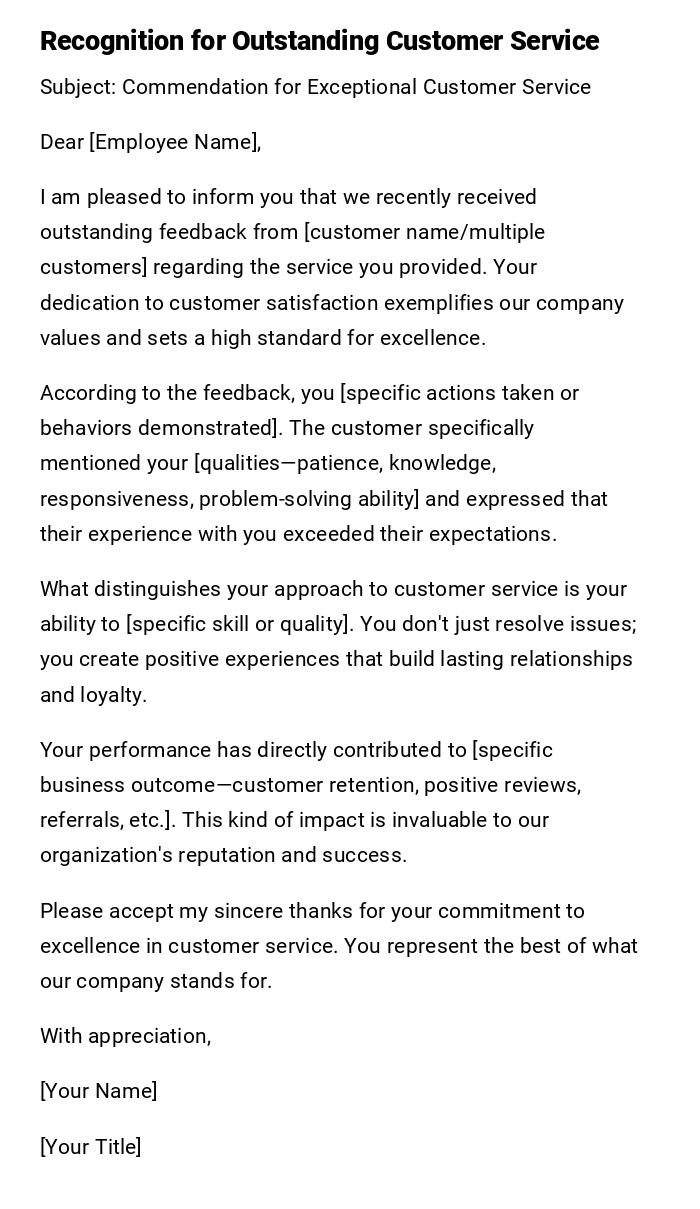

 Download Word Doc
Download Word Doc
 Download PDF
Download PDF